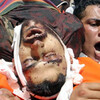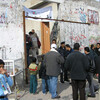
The three monkeys of the Israeli media
9 June 2005
For nearly 40 years, Israelis have known Haim Yavin’s face. Now they also know his opinions. Whether that is leading to any deeper understanding of his message about the functioning of the Israeli media is less certain. “Since 1967, we have been brutal conquerors, occupiers suppressing another people.” It is in such terms Yavin has been expressing his disgust for the Israeli occupation in the five-week series of reports “A Land of Settlers” currently being broadcast on Israeli Channel Two. When Yavin “came out of the closet” and affirmed publicly his political views on the occupation it sent shock waves through his audience. Read more about The three monkeys of the Israeli media








